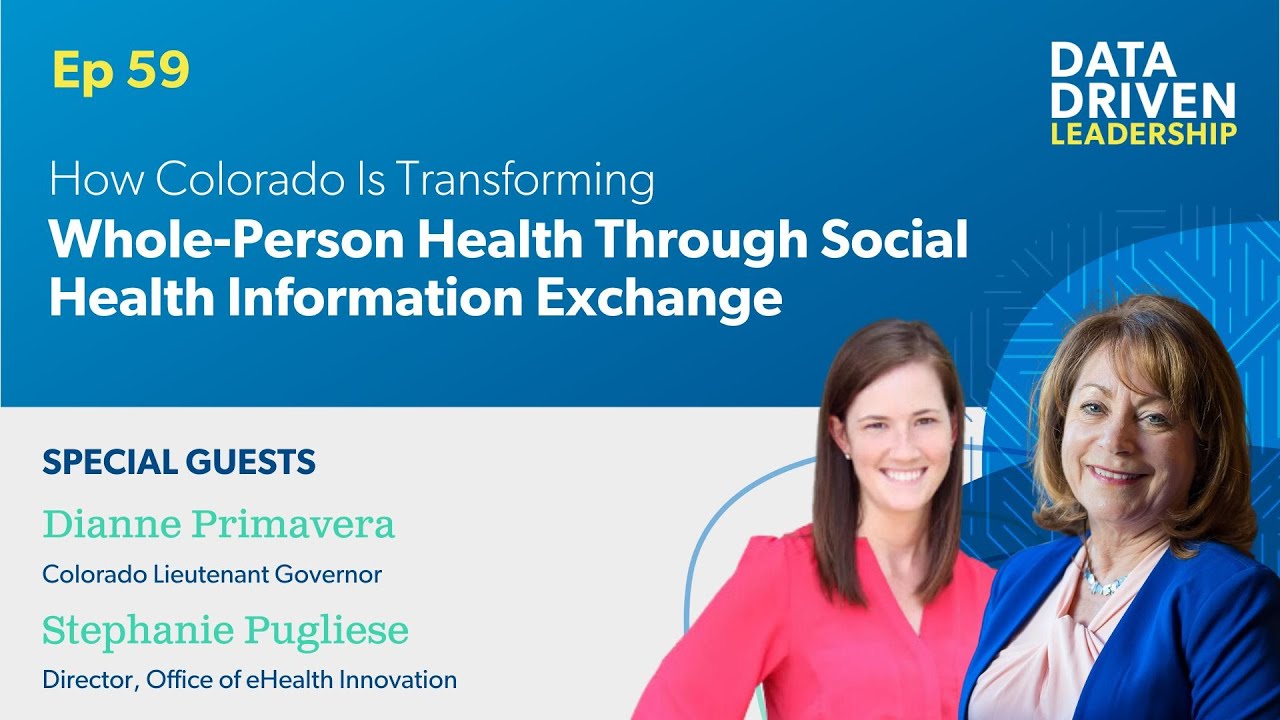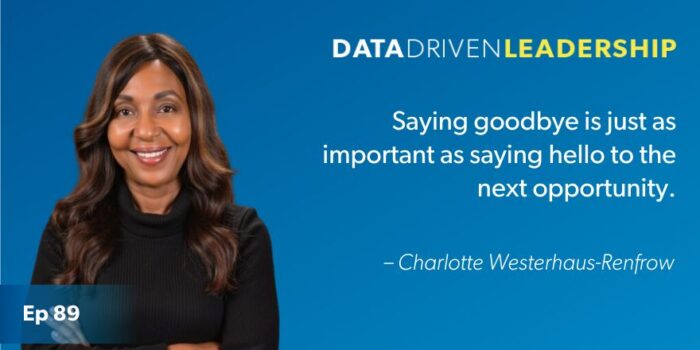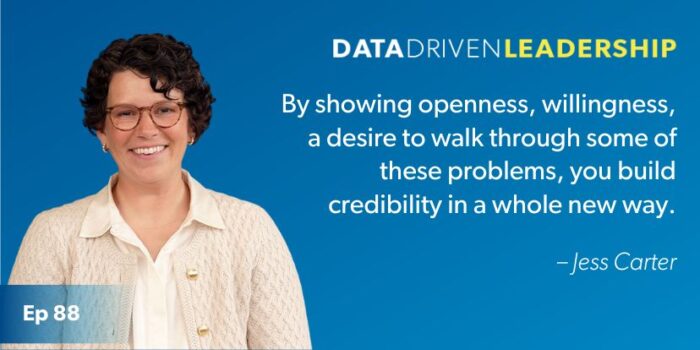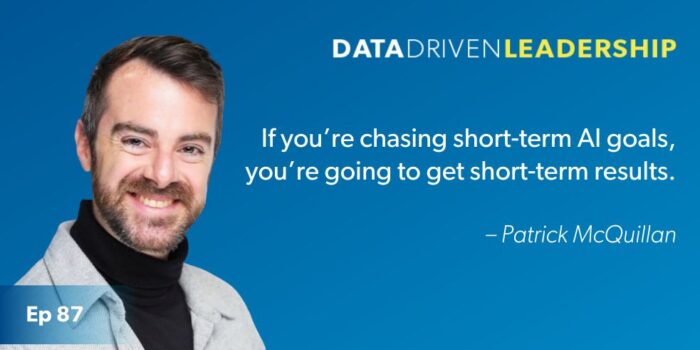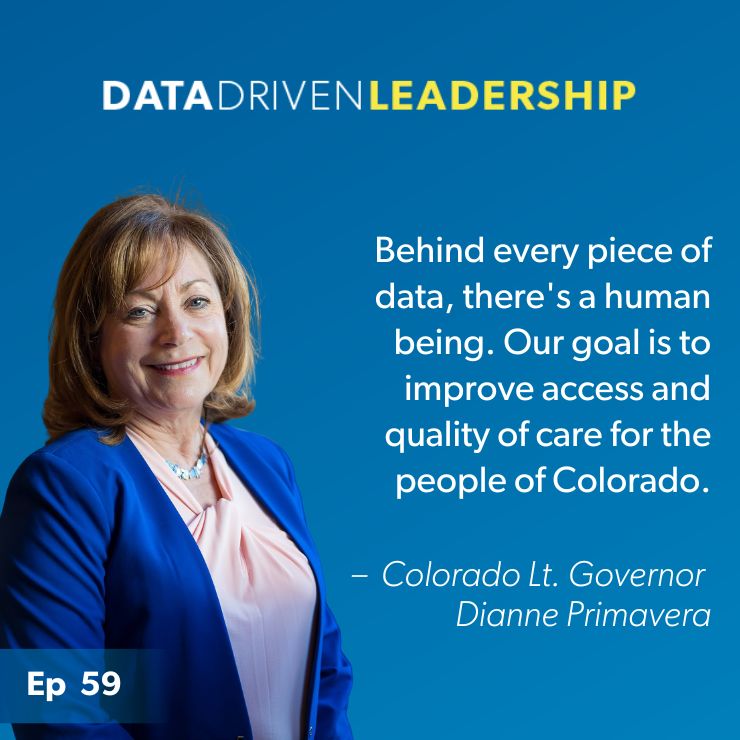
How Colorado Is Transforming Whole-Person Health Through Social Health Information Exchange
Targeted data solutions to help uncover who your programs are reaching — and who they are missing. Learn more about our Health and Human Services.
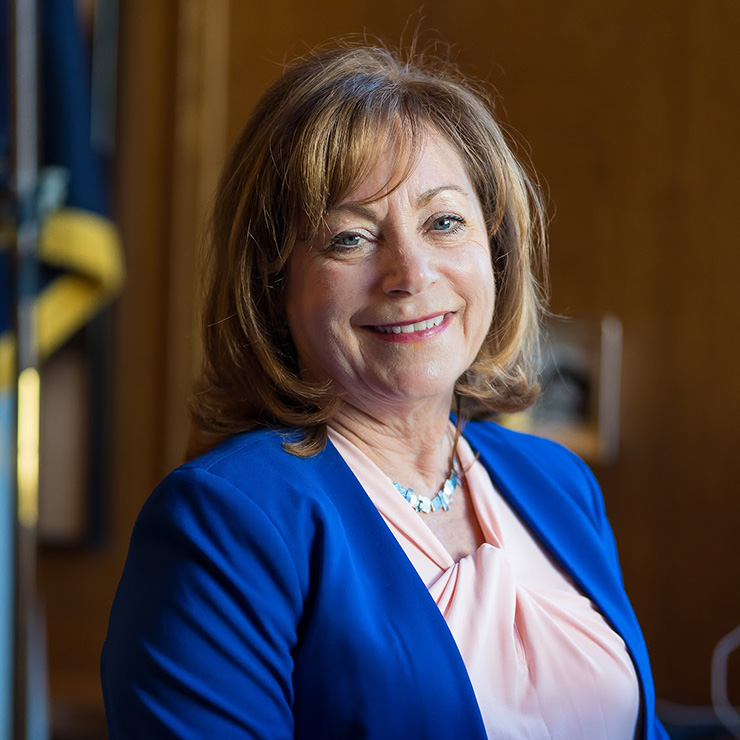
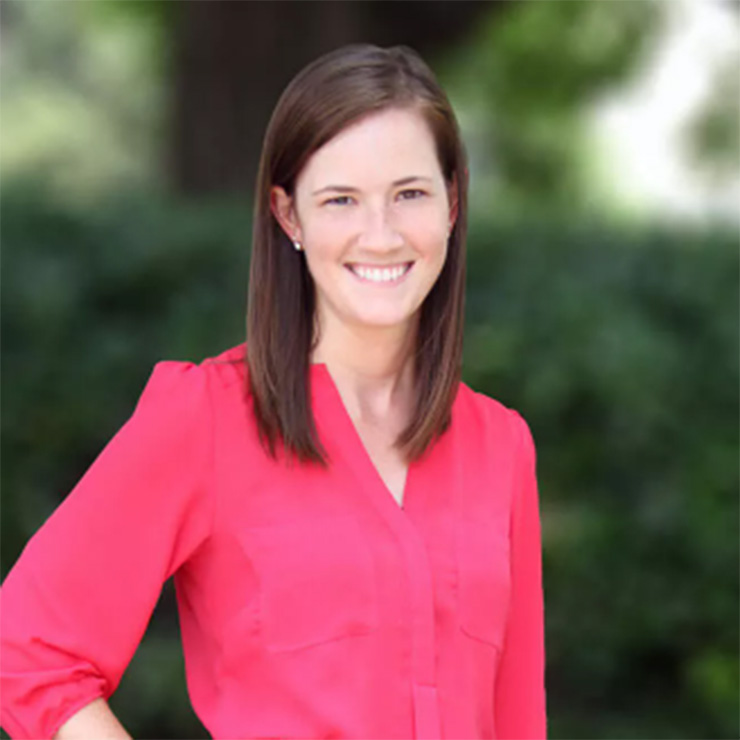
Transcript
This has been generated by AI and optimized by a human.
Show ID [00:00:04]:
The power of data is undeniable and unharnessed, it's nothing but chaos.
The amount of data was crazy.
Can I trust it?
You will waste money.
Held together with duct tape. Doomed to failure.
This season, we're solving problems in real-time to reveal the art of the possible. Making data your ally, using it to lead with confidence and clarity, helping communities and people thrive. This is Data-Driven Leadership, a show by Resultant.
Jess Carter [00:00:16]:
Welcome back to Data-Driven Leadership. We're excited to host two remarkable guests today, Stephanie Pugliese and Lieutenant Governor Dianne Primavera from Colorado. Guys, our first Lieutenant Governor on the podcast. In today's discussion, we'll explore how Colorado is leading the nation in integrating healthcare data through the Office of eHealth. This initiative is vital for making healthcare information more accessible. Here's what I mean. Many of us have experienced the frustration of having to repeat our medical histories at different offices, and sometimes that means reliving traumas experienced due to disconnected data.
Jess Carter [00:01:07]:
Lt. Gov. Primavera and Stephanie are committed to enhancing citizens experiences by addressing these challenges head on. Not only are they helping connect data between offices, but are also it helps in a whole bunch of ways. I don't know about you, but I have felt rushed in medical appointments and often will find myself accommodating what a doctor said before I've really thought it through. There may be instances where patients nod at a referral for physical therapy for sake of argument before they've had a chance to tell a doctor that they don't have access to transportation. This eHealth initiative can help identify those moments, those gaps in social determinants of health, and maybe accommodate suggesting referrals in those situations. So to kick off this episode, they'll clarify some of the distinctions and terminology in this world if you don't live in healthcare, often things like what is the Office of eHealth versus a Department of Health or an HIE? And they'll help us understand how those entities work together for patients and citizens.
Jess Carter [00:02:06]:
While the technical aspects can seem complex, they do a really good job breaking it down into clear terms. The goal is to safely connect your health data when needed, fostering better outcomes for all within the state of Colorado. Additionally, they will delve into some specific use cases that they are particularly interested in addressing, illustrating how this initiative can make a tangible impact. Their innovative approach not only aims to improve individual experiences, but also serve as a model for other states and leverage some of these insights at a systemic point of view. What's particularly inspiring is how Colorado's efforts set a standard for a national movement towards more integrated health system. Stephanie and Lt. Governor Primavera share their vision for encouraging other states to adopt similar initiatives, underscoring the importance of collaboration while doing so. Pay attention not just to what they're doing, you guys, but how as data-driven leaders, they're so on top of the challenges that we often face that I actually have to emphasize it in the conversation.
Jess Carter [00:03:13]:
They're so good at focusing on the challenges that come up when you're working with different entities with their own priorities. And they really start with the people they talk about listening, staying in relationship with one another. It is an assumed approach or tactic that they use to be successful. And I was honored to be able to call that out and point out what a great job that they do. Join us as they discuss the significance of this initiative, its impact, and the specific challenges they aim to tackle. We'll explore their insights and the hope they bring to this transformative work. Let's get into it. Welcome back to Data-Driven Leadership.
Jess Carter [00:03:49]:
I'm your host, Jess Carter. Today we have a powerhouse duo, Stephanie Pugliesi from Colorado's Office of eHealth Innovation and Colorado Lieutenant Governor Dianne Primavera. Hey guys. Welcome.
Dianne Primavera [00:04:02]:
Thank you. Thanks for having us. Thank you.
Stephanie Pugliese [00:04:05]:
Pleasure to be here.
Jess Carter [00:04:06]:
We are so glad to have both of you. And so we're going to start off right away. There's a little bit of context I want to get into, but first, why don't you both. Let's start with Stephanie. Just introduce yourselves and tell us a little bit about the work you do and why it's important to you.
Stephanie Pugliese [00:04:19]:
Thanks, Jess. And hello listeners. I'm Stephanie Pugliese. I'm the Director of the Office of eHealth Innovation in Lt. Governor Dianne Primavera's office. We are in the great state of Colorado. Our office has the unique and fortunate opportunity to coordinate health IT throughout both state agencies and kind of the bureaucracy of the state as well as across all 64 counties in Colorado.
Jess Carter [00:04:48]:
That's amazing. That sounds like a, like a brief job. Super easy,
Stephanie Pugliese [00:04:53]:
Super easy. Always clear, never any question.
Jess Carter [00:04:57]:
Very black and white.
Stephanie Pugliese [00:04:58]:
Yes. No gray area ever.
Jess Carter [00:05:02]:
Well, and Stephanie, is there a, like a why? What got you into this?
Stephanie Pugliese [00:05:06]:
I have a background in public health also in state and local government. And so this is kind of my, my dream job, honestly, especially working under Lt. Governor Primavera who cares so much about people and their health and making truly a Colorado for all. And so I ended up here through I think a series of fortunate being in the right place at the right time and kind of gathering my skills along my career to get here. So it's been a long and winding road, but it is truly never boring here. I get to work with all kinds of brilliant and interesting people on a daily basis. And I think my why is truly that I think government can and should work better for our constituents. And that's true in the health IT world more than anywhere, I would argue.
Jess Carter [00:05:59]:
I appreciate that. Thank you, Stephanie. Lieutenant Governor, what about you?
Dianne Primavera [00:06:05]:
So I'm the Lieutenant Governor for the great state of Colorado. So in addition to being second in command and filling in for the governor when needed, I actually run several programs out of my office. So Aerospace and Defense is one. Colorado Commission of Indian Affairs, Colorado Disability Policy. Serve Colorado, which is AmeriCorps, and then the Office of Saving People Money on Healthcare. I'm the director of that. And under the Office of Saving People Money on Healthcare is the Office of eHealth Innovation, which is where Stephanie comes in. So, you know, I've been both a patient and a policymaker. And so when Stephanie talks about how I really try and keep the patient in the forefront of my mind, that's really what it is.
Dianne Primavera [00:06:52]:
Because behind every piece of data, there's a human being. And ultimately, what we're trying to do is make sure that we improve access and quality of care for people in Colorado. And that's part of what the Office of eHealth Innovation is doing.
Jess Carter [00:07:07]:
Wow, that's amazing. Thank you for sharing that. So I really do see this as kind of setting the stage for this conversation because the health world is really complex. I mean, just selecting your own options during open enrollment is, like, overwhelming to a lot of people. And so when you talk about this eHealth, this Office of eHealth, can you guys help explain to somebody who's not a health person they don't spend 45 hours a day or a week, I'm sorry, thinking about it, what is an eHealth department or office, and how does that. How does that play in the rest of health care or, you know, departments of health?
Dianne Primavera [00:07:45]:
I'll start, and then Stephanie can jump in. So the Office of eHealth Innovation is a fancy way of saying we're using technology kind of behind the scenes. You know, a lot of the work that Stephanie and her staff do is behind the scenes to make sure that people can get access to health care, to make sure that it's quality health care, to make sure records transfer. Stephanie's done a lot of work in the telehealth arena. So it's just kind of a fancy way of saying we're using technology to improve the health of people of Colorado. So Stephanie might have something more to add to that.
Stephanie Pugliese [00:08:20]:
You're always a hard act to follow, Lieutenant Governor. She says it so beautifully and eloquently. And then I'm over here like, “And the records move…” And so that's the only thing to add, really, is obviously, myself included. This is really focused on making an individual's data move and speak on their behalf as they decide. Right? Our belief is that each of us created this data from our experience, and it should be working for us as opposed to the opposite, where we're having to work for that data and to make sure that the whole picture of our health is really reflected to our latest provider.
Jess Carter [00:09:01]:
That's amazing. So I'm assuming not every state has something like this office, is that right?
Dianne Primavera [00:09:07]:
Well, actually, Colorado leads the nation in digital tools and services that support the health of all people in Colorado. So, you know, we're really proud of that. So I think they do have something similar.
Jess Carter [00:09:19]:
Okay.
Dianne Primavera [00:09:19]:
But I think Colorado really leads the nation in this work.
Jess Carter [00:09:22]:
Wow. Okay. That is amazing. And so when you explain what the Office of eHealth Innovation is, which you've kind of done, what does make it unique? When you say that it's pretty incredible and pretty advanced, what does that mean?
Dianne Primavera [00:09:37]:
Well, again, you know, Stephanie works all the technology and the infrastructure, you know, behind the scenes. But, for example, it might mean that, say, you go down to Southwest Colorado and you're hiking and you break a leg and the doctor orders X-rays and lab work and whatever else they need to do to diagnose whatever your injury is. Then you come back to Denver where you live, and, you know, instead of the doctor here repeating all those X-rays and lab work and everything else, the records can actually transfer now, thanks to the work that the Office of eHealth Innovation has done. So that will save people money on health care and it'll make, you know, their access better and, you know, more timely and that kind of thing. So that's one of the things that the Office of eHealth Innovation has worked really hard on, in addition to the some of the telehealth work that we've talked about. And then I think later on in the program, we're going to talk a little bit about the social impacts and influences of health and how the Office of eHealth Innovation has been working to address those as well.
Jess Carter [00:10:39]:
That's amazing. That image is really helpful, I think, for people, too, when it's like, well, what does this all really mean? And it's, well, you've sat in the sixth appointment where you're writing down the exact same thing, situation, and event that happened that caused you to be in the room? And is it your PT after you had surgery to repair a broken whatever? And it's the idea that there's a little bit less burden on you because you're already trying to heal, you're already trying to get back to work and take care of your kids and go to your fifth appointment. And the fact that it's like this one less thing to have to do sounds pretty important, I would imagine, actually, like actually impactful for outcomes.
Dianne Primavera [00:11:16]:
Oftentimes when people are in a crisis situation or a traumatic situation, they don't always remember all the things that all the tests, all the X-rays, all the everything. So, you know, you get back to Denver and the doctor says to you, well, what did they do when you were down in the southern part of the state? And you try and remember, right? This will help to make sure that the doctor has all the accurate information at hand and doesn't have to rely on your memory.
Jess Carter [00:11:43]:
Wow, that's an excellent point. And maybe then you don't have to go through, if it was traumatic, retelling that. Right? Well, there's one other kind of term I wanted to have you guys define for me and just for listeners, tell me about a community information exchange and what Colorado is doing in this space with the Colorado Social Health Information Exchange.
Dianne Primavera [00:12:04]:
So a community information exchange is an infrastructure that enables data sharing from many different types of partners, similar to a health information exchange, but inclusive of partners and data beyond typical health data. So in Colorado, we've taken the principle of a CIE, because we have to have an acronym for everything, and expanded it to be statewide. We know that our communities are already doing incredible work to support folks beyond the walls of a traditional care setting. So with the CoSHIE, which is the Colorado Social Health Information Exchange, which is something I mentioned a little bit earlier, we aim to support that ongoing work by providing investments into technology and partnerships at the local level. We have approached this through a hub-and-spoke model, which Stephanie can probably get into better than I can, where OeHI is leading the development of a unifying architecture at the state level or the hub, and partnering with communities at the local level to enable and learn from what is already working on the spokes. So, Stephanie, did you want to add anything to that?
Stephanie Pugliese [00:13:12]:
The only thing maybe to tag in there, too, is on the community level, like Lieutenant Governor mentioned. We already know this work is happening and we know that communities have figured out what works best for them, as well as recognizing that each community has unique priorities and needs. And so we're really proud of this approach of both kind of the traditional top-down, you know, the state will build something for you as well as the bottom-up and saying, you're already doing this. We know that we're not swooping in with all fresh ideas to change everything you're doing. We want to recognize what you're doing, learn from it, invest in it, and then connect it to that statewide model. And so we just had a request for applications or an RFA—again, we love an acronym closed last week for that community kind of hub model.
Stephanie Pugliese [00:14:07]:
And so this is truly the first approach like this in the nation. And it took a lot of conversations with our federal friends to really emphasize the need for this to be paid for at the community level, too. Kind of circling back to what is unique about our office, which, our office is able to work really closely with our state Medicaid office to pull down federal funds and match every dollar that the state provides for our work with $9 at the federal level.
Jess Carter [00:14:38]:
Wow.
Stephanie Pugliese [00:14:38]:
So that makes the money go a lot further and really helps us to distribute it kind of downstream a lot more as well.
Jess Carter [00:14:46]:
I am so impressed. Just because I think about, to your point, what's already been made clear to me is the value proposition of a citizen doesn't just stay in one part of the state. And the fact that there's this interconnectivity between different regions geographically to support a citizen is so neat. I'm sure there are communities within Colorado that couldn't afford something like this on their own. And the fact that the state can show up and the communities can show up and support each other in this model, that just seems like an unbelievable, really high-value use of some of these funds. That's really exciting.
Stephanie Pugliese [00:15:22]:
Thank you. We think so.
Dianne Primavera [00:15:24]:
I think Stephanie's staff has done a really good job. They just completed a listening session around the state with many stakeholders and patients and things like that to talk about the work that they're doing and how we can better improve services throughout the state. So, you know, I think sometimes people have the perception of government that we sit in an ivory tower and just make decisions and really don't get a lot of input. But it's really a participatory process putting this all together and putting our health IT roadmap together. And so kudos to Stephanie and her staff for doing that.
Jess Carter [00:15:56]:
That's super neat. You guys have both talked about listening a lot already, which I think is really encouraging for data-driven leaders out there, that it's not just about telling everyone and pointing at where we're going, it's about listening first. So thank you for that. One of the other questions I had for you guys is, we've heard this phrase “social determinants of health,” or people in health have heard that phrase. Maybe not everybody has. But why is there a focus on social determinants of health or health-related social needs? Why has this come up? Why is it critical to address those factors?
Dianne Primavera [00:16:30]:
So, you know, when the governor and I first took office, we had a conversation and, you know, I emphasized to him that all roads lead to health. And so we actually have two health cabinets. One that involves directors of the different health-related departments and the other one is all the other different departments. So, you know, you think about agriculture, if people don't have healthy food, they're not going to be healthy. So research shows us that social determinants, or we also call them the social influences of health, can actually be more important than the health care people receive. I think it was the World Health Organization talking about social determinants of health. Social determinants can account for anywhere between 30 to 55 percent of health outcomes. So it's things like, you know, do you have a stable house to live in, do you have access to clean air, do you have access to a quality education? Those kinds of things.
Dianne Primavera [00:17:26]:
And they can often hit underserved communities the hardest. So that's why it's really important to address the social influences of health. Addressing these factors is making Colorado one of the healthiest states and also one of the leaders in this kind of effort. So, you know, I just think we can better support people's health holistically, you know, reduce disparities and make healthcare more affordable and effective overall by addressing the social influences of health.
Jess Carter [00:17:54]:
Well said. And I appreciate you explaining what a social determinant is because I think that there are some people who are like, what is that? And I've always, I've had some examples. But it's helpful to say this isn't so much about what your blood pressure is. It's more about do you have a safe environment that you're in that you find yourself coming home to? Do you have access to food, clean water, et cetera? So that's really helpful and it's interesting and neat that in health care, where we have a tendency to sort of close our view and look at your health, your blood pressure, your heart rate, that we are starting to see these other factors and realize that they are playing a meaningful enough role to become this much of a priority, which makes sense as human beings. Right? But it's like the data wasn't there before. So it's exciting to me that you guys have that. What I get really excited about, especially having helped with the governor's response in Indiana to Covid, is I'm looking and listening at some of these priorities, and I'm curious what the implementation of these things look like on the ground.
Jess Carter [00:18:57]:
Not just what does it look and feel like, but maybe also… I have this imagination. I'll call it that. That because of the pandemic, a lot of state agencies did have to raise their bar on, like, health modernization, that they had to take on some new initiatives about new datasets, maybe some social determinants, et cetera. And I think some of them have landed… I'll make up a turret term, the problem of visibility. Now they have all this data, They've visualized it, they can see it, and they don't know what to do with it yet. That's still an exciting place to be. I'm not villainizing that.
Jess Carter [00:19:33]:
That's still. Hey, that's great. But it seems like you guys have so much going on in Colorado about health that you have different initiatives that are at different points on that maturity spectrum. Some places were building infrastructure to have something like this, and in some places, you're. You're chasing down real problems that Colorado citizens have. So would you just tell me a little bit about what. What does this look like on the ground? What does it feel like?
Dianne Primavera [00:19:56]:
You know, Stephanie can add a lot more to it because she's more on the ground than I am, she and her staff. But, you know, we're just now starting to pilot this social health information exchange. So maybe on the ground, it might look like I go to the doctor and I need a certain medication because I have a certain illness that needs to be refrigerated, and I don't have any way to refrigerate my medication. So it doesn't do me a lot of good to walk out of a doctor's office with a prescription that ultimately isn't going to be effective. So the social health information exchange can help put people up with those kinds of resources. You know, if you're a diabetic and they tell you to follow a diabetic diet and you don't really know what a diabetic diet is, through the social health information exchange, they could perhaps hook you up with a nutritionist or some other kind of program that can help you. So it's more than walking out of an office with a prescription. It's more of a holistic look about how can we really maximize a person's health.
Jess Carter [00:20:56]:
Those are gaps that I think have gone unnoticed for so long. I would not have thought of those things ever. Out of all of this, are there specific use cases you guys are pursuing?
Stephanie Pugliese [00:21:06]:
Yes. So we really started with use cases that would impact the most vulnerable populations. Our initial four kind of focus populations are those experiencing homelessness, individuals with disabilities, and reducing barriers to care for individuals, navigating substance use disorder, and reconnecting individuals exiting incarceration to their communities.
Jess Carter [00:21:32]:
Wow.
Stephanie Pugliese [00:21:32]:
So really focusing on bolstering that data flow for those particular populations at this time, thinking through, you know, one of our first kind of data source partners is Colorado's Homelessness Management Information System, or HMIS, that each state has one of those, again, to your earlier point, just kind of at varying points of population data to, you know, recommending or identifying gaps, identifying funding, things like that. So really partnering with our Department of Local affairs as well as, again, our state Medicaid agency, and then even partnering with what we call coordinated entry Partners or communities of care. Of course, again, we love all these acronyms, CoC or CE. Those are the folks who are truly the front lines working with individuals experiencing homelessness. And, you know, that's a traditionally really difficult population, data-wise as well, for a lot of reasons. But really focusing on, you know, if this individual has already filled out a social needs screener yesterday and they walk into a different clinic today, that clinic does not need to screen them again. To our conversation about repeating trauma as well. Right?
Stephanie Pugliese [00:22:46]:
Going through those screeners all day, every day, when you're just trying to get the basic services that you truly are entitled to, that's not how the system should be supporting people. And so that's where the CoSHIE really aims to move the data that's already there into the hands of providers who need it, rather than, again, kind of duplicating that work, putting that person through that again.
Jess Carter [00:23:09]:
Okay, because some of this is new. One of my questions is, how do you, how do you ensure success of these programs? What are key focus areas? Where do you guys, where you have a hard time going to sleep at night? Stephanie, what are some of those concerns that you guys might have and how do you, how are you reassuring the program?
Stephanie Pugliese [00:23:24]:
I can start and then Lieutenant Governor can add her midnight thoughts as well. But I think some of the challenges have been actually indeed on the data side. So it's like you knew, Jess, to ask this question. And that's where some of the less, the less exciting work comes in. Right?
Stephanie Pugliese [00:23:46]:
Or less flashy work as far as memorandums of understanding and data sharing agreements, really getting those to a place that are strong for the partners, for the state, and then for the system, too. Again, this is a brand-new system and it's the first of its kind. And so building trust is the most important thing here. And you know, data moves at the speed of trust and relationships, not at the speed of technology, especially in government.
Jess Carter [00:24:13]:
Preach. That is a word that's well said because I'm going to interject for a second because, Stephanie, I feel like you said like when you were like, hey, actually, the data is one of the things that's been complicated or hard. I sort of feel like that's the case because you guys have been so thoughtful about the people, because you've listened so well. Because I think most people, when we're talking about their story on this podcast, are talking about: It's the people, it's always the team. It's always like, that's the hardest thing to move. You guys have really done the work to anticipate that and spend a lot of time and energy hearing people across your state and understanding what the needs are that I feel like you got to kind of head that off. Is that your lived experience?
Stephanie Pugliese [00:24:53]:
Yes, absolutely. And so kindly put. So I really appreciate that. But you're right, we know that this is not an opportunity of if we build this system, they will come because this kind of data, especially social health data, is not yet really regulated. And so it's either the Wild West or nothing. And we're trying to build that path as we go down it, really leaning on our community partners and saying, how are you handling it? How do you see it? And also, more importantly, how do your clients see it? How do folks want their data to move? How do they want their data to speak for them? Or, do they not? Did they want to speak first and have their data follow them? Because that's what happens now. And we have the option to flip that. But that's not always the right thing, either.
Stephanie Pugliese [00:25:45]:
And so it's very nuanced. And I think Lieutenant Governor might have thoughts about that too, as far as technology getting kind of ahead of people or how we balance that.
Dianne Primavera [00:25:55]:
Yeah, well, you know, I think, you know, behind the scenes we're doing a lot of, you know, you asked about success and making sure that we have our memorandums of understanding in place. So check that box. Data sharing agreements in place, you know, check that box. Those are all really critical to the implementation of the program and to make sure that it works and you know, building a first-of-its-kind system, we have to build trust. So you know, check that box. You have to make sure you have security in the technology. So you know, check that box.
Dianne Primavera [00:26:28]:
And so there's a lot of things that have to happen behind the scenes to make sure that this data sharing works. How we measure success is, first of all getting all those boxes checked so that we have all that in place, and then making sure that, you know, we see the one-on-one cases, you know, this person got helped with this because of this system and then you gather all that data together at the end and work on more of a global look. So what policies need to change, what laws need to be implemented, those kinds of things. So if we can see some individual successes as we go and then also systemic wins down the road, I think that's how we'll measure the success.
Jess Carter [00:27:08]:
Wow, it's so exciting you guys. I'm so impressed. I mean, one of the things I'm curious about is, well, and Stephanie, you already talked about, you know, some of the challenges you, you faced were some of the data challenges. Are there any other challenges you wanted to mention that were right up there with it?
Stephanie Pugliese [00:27:24]:
I could go on for days, but I think one that, that I maybe teed up but didn't quite follow through on is that, because this is a new system and it is very nuanced a lot of times explaining it, explaining CoSHIE in a way that resonates and is clear without getting too technical or too data-focused has been a challenge, especially for our team. We get into the acronym soup, we get into the state speak and everything like that. And so I think it's been a challenge and a gift to our team to have to flip that and share kind of the value first and the people first and also being realistic about what this system is and what it is not, because it can be a little bit vague, it can quickly become one-stop solution that's going to solve all of our problems. And I would love for that to be, this is a ten-year project. I would love for that ten years from now for us to come back and say we solved it. The reality is that we're doing the best we can with what we have and the bounds of regulations and reality. And that's still for a lot of folks, seems too good to be true. Frankly, I do recognize what a privileged problem this is, that we have the opportunity to build such an exciting system that people don't believe us.
Jess Carter [00:28:51]:
Yeah.
Stephanie Pugliese [00:28:52]:
That it's going to be real. You know, I think thinking through, especially coming in again as the state and saying, we're going to build a system that won't change your workflow, that can go between vendors and that you may not even know you're using, you just may notice that your data is more complete. How would one do that? And luckily, that's what we have the privilege of doing. And so I think, in a way, each release of this system will overcome a lot of the big challenges that we have, which are, will this ever happen and will it work? Right?
Jess Carter [00:29:35]:
Yeah. Well. And if I understand it right, I mean, one of you guys putting people first and listening first is really important because in this exact situation, you have this challenge of, you need individuals to sort of buy-in with their data and say, hey, with my agency, I'm making this choice about my data. And you need the community partners, it sounds like. Right? You need people who are also saying that. So there's a lot of. When you talk about memorandums of understanding and data-sharing agreements, that is heavy.
Jess Carter [00:30:03]:
And that can take a minute. If you don't mind, one of the questions of curiosity I have is the leadership angle of kind of this podcast's point. Were there times, are there times now where that feels like a mountain that just gets taller every time you try to climb up? Like, how do you guys stay motivated? Because I imagine that can be hard.
Dianne Primavera [00:30:23]:
Well, I think part of the way you stay motivated is keeping the end goal in mind, you know, that ultimately this is going to improve access and quality of care for people. Keep that in the forefront of your mind. And, you know, that really helps because, you know, like Stephanie hit upon, some people are reluctant to have their data shared. That's one of our challenges. And providers and docs in their offices, they don't want to engage in anything that's going to make their lives more difficult. And so, you know, making sure that, you know, we assure them that this is actually going to help with their patient care and it's not going to be a burden and things like that. So keeping all that in mind and knowing that we're actually helping the providers and that we're helping the patients, I think helps us go to work every day. Right, Stephanie?
Stephanie Pugliese [00:31:12]:
It absolutely does. I think the other thing is, we have a nimble team who will keep working on this until the mountain is a molehill. And every day that we get even a small win, that's huge for us. You know, the fact that we, we've been under contract for this build for less than a year and have gotten through all of those favored three-letter acronyms, the MOUs and the DSAs. And again, the relationships are really what make it doable and what keep us going. You know, if we have a day where we feel like we didn't quite get where we wanted to go, those somehow are the days that our partners speak up and say, hey, I had this great conversation or I saw this presentation you all did, or you know, it could be anything. But I think that's where really building the community to support not only the technology, but truly kind of the movement that Lieutenant Governor and Governor have facilitated in this area is what keeps us going once, you know, one of us might get tired and then. And then somebody takes up that kind of cheerleader role.
Stephanie Pugliese [00:32:27]:
And so the bigger our community gets, I think the easier it is to keep going as well.
Jess Carter [00:32:32]:
I'm really impressed. And I think even from a leadership perspective, I mean, Lieutenant Governor, something that you said that for me resonates as a leader is there are times where I can be so single-minded when I'm thinking about something that I'm told to achieve, that if you're on the way, you can be in the way. And the ability that you both have articulated to continue to stay committed to the vision and that that vision is inclusive of people that are on the way, that if you're a community partner and you don't want to use it or you're afraid you're not in the way, you are part of the vision and you guys are finding ways to continue to listen and stay committed and work in those relationships. I am so impressed with that leadership. So I know that we're, we're kind of wrapping up on time. Is there anything we have not talked about that you guys want to make sure we do mention?
Dianne Primavera [00:33:25]:
I think, you know, Stephanie was talking about our use cases and you know, the governor and I have been committed to a Colorado for all. So, you know, I think what's really neat about the use cases that Stephanie's working on is that the fact that this would impact the most vulnerable populations first, including, you know, people that are homeless, people with disabilities, people who are navigating substance use disorders and, and people that are exiting incarceration in their communities. So kudos to Stephanie and her staff for focusing on the most vulnerable, because if we can address those populations, then everything else will be much easier. So I just want to talk about how this is really important for a Colorado for all.
Jess Carter [00:34:11]:
Well said. Stephanie, anything else you wanted to share?
Stephanie Pugliese [00:34:14]:
I think that's the perfect closing note.
Jess Carter [00:34:18]:
So if people want to learn more about this, where can they go to check in and check it out?
Stephanie Pugliese [00:34:24]:
If people would like to learn more they can go to the OHI website which is oehi.colorado.gov. Awesome.
Jess Carter [00:34:34]:
Okay great. Thank you so, so much for joining us today and teaching us about leadership and tech and a little bit of health too. We really appreciate it.
Thank you guys for listening. I'm your host Jess Carter. To learn more about this important work like they shared in the episode, please check out the links in the show notes. And don't forget to follow the Data-Driven Leadership wherever you get your podcast rate and review letting us know how these data topics are transforming your business. We can't wait for you to join us on the next episode.
Insights delivered to your inbox


